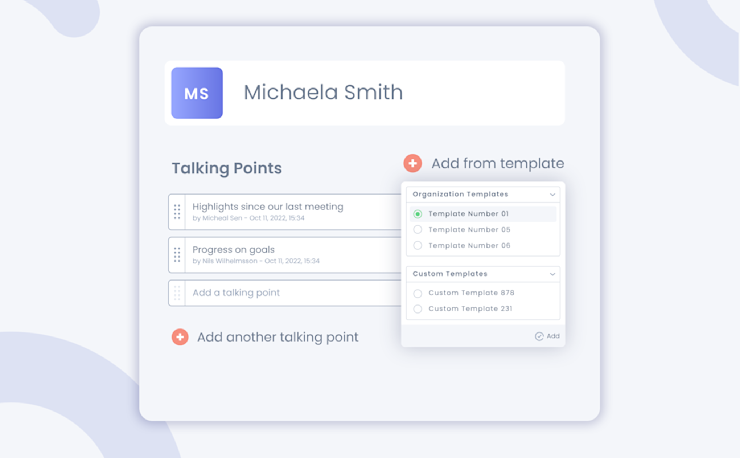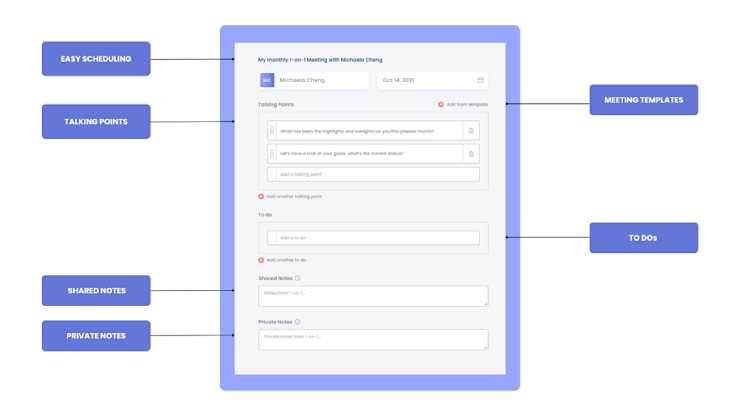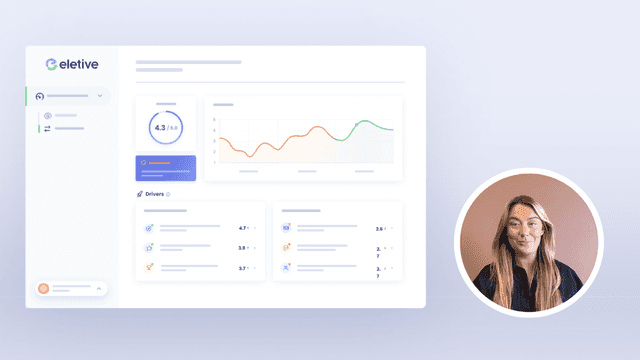Discover effective one on one meeting questions for managers to boost employee engagement, improve team performance, and foster a positive work culture.
Why are 1-on-1 meetings important?
Regular 1-on-1 meetings are an opportunity for employees and managers to have a dialogue about the employee’s performance and experience, and to steer it in the desired direction. Scheduled reflective conversations create a platform for safe communication, where both managers and employees can raise important issues.
Regular 1-on-1 meetings are an important tool in the work to create a good psychosocial work environment. They’re a way to ensure that all employees understand the company's goals in both the short and long term, what is expected of them, and how they can contribute to the organisation's development.
1-on-1 meetings give both managers and employees an opportunity to highlight problem areas as well as successes. And a well-functioning structure for regular employee-manager meetings creates an open climate based on communication and transparency. This means problems can be quickly identified and addressed and contributes to a culture where every employee feels seen, heard, and included. Which, in turn, contributes to higher employee engagement, higher productivity, and lower staff turnover.
How often should managers hold one-on-one meetings (1-on-1s) with their staff?
1-on-1 meetings are important for both the manager and the employee, and helps develop their relationship. Regular conversations provide an opportunity to reflect on and discuss various issues, both those that are relevant here and now and those that concern a more long-term perspective.
How often it is appropriate to have 1-on-1 meetings depends on the structure of the team and the business. But a good rule of thumb is that every employee should have time set aside for a conversation with their immediate superior at least once a month. This should be seen as a minimum.
In addition, many companies also schedule performance appraisals or performance reviews once a year. This annual conversation is of a more in-depth nature, with a greater focus on letting the manager and employees develop their thoughts on the work environment and tasks as a whole.

One-on-one meeting questions format
Structure your one-on-one meetings to ensure productivity and engagement by setting clear expectations with your employees about the purpose, frequency, and duration of these meetings.
Include conversation topics that cover career development, workload management, team collaboration, achievements and recognition, and potential challenges or roadblocks in projects.
This approach ensures a comprehensive discussion that covers various areas where employees may need support or guidance from their managers.
For further insight into how to facilitate productive one-on-one conversations.
What makes a good one-on-one meeting question?
A good one-on-one meeting query should be inquisitive, stimulating, and adapted to the specific worker.
Open-ended: Avoid yes or no questions; instead, use queries that require more elaborate responses.
Thought-provoking: Encourage reflection by asking about challenges faced, lessons learned, or ideas for improvement.
Tailored: Customise your questions based on each employee's role, goals, and experiences within the company.
Asking the right questions can lead to valuable discussions around personal growth and development.
💡Pro tip: Consider using Eletive's platform, which is designed specifically for measuring employee engagement.

What questions should be included in a one-on-one (1-on-1) meeting?
1-on-1 meetings are the perfect forum for setting goals and following up on individual results.
They’re also a good opportunity to capture and take advantage of valuable insights and ideas, and to take a step back and together evaluate the daily work.
In this section we’re going to cover 6 categories of one-on-one questions. So let’s get into it…
Insightful one-on-one meeting questions for great managers
Great managers know that asking the right questions during one on one meetings can lead to better communication, trust, and employee performance. Here are some sample questions:
Career Growth: What skills do you want to develop, and how can I support your professional growth?
Motivation: What excites you most about your work, and are there any projects or tasks you're particularly passionate about?
Priorities: Can we review your current priorities together, and is there anything we need to adjust for you to be more successful?
Roadblocks: Are there any obstacles preventing you from achieving your goals, and how can I help remove them?
Suggestions for Improvement: Do you have any ideas on how our team can improve its processes or collaboration efforts?
As a leader, it is essential to pay attention and offer aid where necessary. Check out Forbes for more great one on one meeting questions to help you build stronger relationships with your team.
First one-on-one meeting with employee questions
Establishing a connection, laying out objectives, and creating faithfulness are fundamental in the initial one-on-one gathering between a supervisor and an employee.
What led you to join our team?
What ambitions do you have for your current position and what are the aspirations that you wish to achieve in this role?
How do you prefer to receive feedback?
Can I do something to aid in your development?
What aspects of our company culture resonate with you the most?
What opportunities do you see for us to enhance our relationship?
In which ways would you like us to collaborate or communicate regularly?
Prepare thoughtful questions to encourage open dialogue and make the most of this initial conversation.
Goal and progress questions
Managers, use one-on-one meetings to discuss goals and progress with your team members to keep them motivated and on track.
What ambitions do you have for the current quarter?
What have you accomplished thus far in relation to your goals for this quarter?
Are there any obstacles preventing you from achieving your objectives?
Do you need additional resources or support from me or the team to reach your targets?
Asking goal-focused questions during one-on-one meetings can increase employee engagement, improve performance, and align individual efforts with company objectives.
Feedback and development questions
Asking the correct inquiries is essential for staff advancement - here are some conversation queries to help supervisors recognize regions of enhancement, give helpful feedback, and back personnel in their expert growth venture.
What do you think your current performance level is? Are there any specific areas where you'd like to improve?
In which skills or competencies would you like to invest more time developing?
What kind of feedback have you received from your peers or other team members recently? How did it impact your work?
Are there any hindrances blocking you from attaining the utmost of your capability at work? If so, how can I help remove them?
Incorporating these questions into regular one-to-one conversation topics will foster open communication and demonstrate a genuine interest in an employee's career progression.
Remember that providing timely, actionable feedback is essential for nurturing talent within the organisation.
Collaboration and teamwork questions
One-on-one meetings are a prime opportunity for managers to discuss teamwork and collaboration with their team members.
How well is our team working together? Are there any specific challenges or opportunities for improvement?
What qualities make someone a good team player? What have you done to help the team's triumph?
Can you share an example of when our team collaborated effectively on a project? What factors contributed to that success?
Are there any tools or resources that could improve communication and collaboration within our team?
By addressing these topics during one-on-one meetings, you can promote open dialogue about teamwork and boost employee engagement. For further guidance on optimising collaboration among colleagues.
Recognition and appreciation questions
Boost employee morale, engagement, and motivation by incorporating recognition and appreciation questions into your one-on-one meetings.
What are you most pleased about achieving? Let employees share their successes and reflect on their progress.
How do you prefer to receive recognition for your work? Tailor your approach to each team member's preference for public or private praise.
Who has gone above and beyond recently? How did they make an impact? Foster teamwork and support by encouraging employees to recognize their colleagues' efforts.
Recognizing hard work and achievements creates a positive environment that encourages growth.
A template for 1-on-1s (staff meetings)
To give everyone in the organisation the opportunity to contribute the best way they can, it is usually beneficial to provide managers with templates for staff meetings and 1-on-1 meetings.
It is also a good idea to use a common platform for the entire company, to plan and document the one-on-one meetings. This way, your managers are supported in their role, and you avoid scenarios where notes from meetings are lost, interpreted differently by the different participants, or managed in different ways by different managers. With clear structures and routines that everyone can follow, it’s easier to ensure every manager books regular meetings, and follows up on them.
This is an example of what a one-to-one meeting template, or a staff meeting template, can look like in Eletive:

Eletive's platform makes it easy to:
create staff meeting templates
schedule 1-on-1 meetings
document what is said in the meetings
Follow up on the discussion with clear goals and action plans – in the same platform
automate notifications and reminders via integrations with slack or your calendar of choice
In the platform, there is room for taking notes during the 1-on-1 meetings, both in the employee’s account and on the manager’s side. There are shared notes and to-dos that both parties have access to, as well as private notes for each individual.
Many companies that today use Eletive previously lacked a standardised process for one-on-one meetings, and for documentation of staff meetings. With Eletive's tool for staff meetings (1on1s), all types of meetings and dialogues can be created, documented, stored and followed-up on in the same user-friendly platform.
Conclusion
Effective one-on-one meetings are crucial for managers to build strong relationships with their team members and ensure they feel supported in their roles.
In this blog post, we discussed the importance of holding regular one-on-one meetings and provided a set of questions to structure them.
Asking the right questions during these meetings can help improve employee engagement levels and identify growth opportunities within the organisation.
Examples of great questions include goal-setting and progress tracking, feedback and development, collaboration and teamwork, and recognition and appreciation.
By utilising these questions, HR Managers can help their employees feel valued and supported while also driving success for the company.
We’d like to offer expert help to build a world-class employee engagement and performance management program. For that check out this page.
FAQ
What questions should a good manager ask in one-on-one meetings?
A manager should ask about goal progress, feedback and development, collaboration and teamwork, and recognition and appreciation.
How can you have effective one-on-one meetings with your manager?
Set clear objectives beforehand, create an agenda, actively listen, provide constructive feedback, and follow up on action items discussed during the meeting.
What are some good questions to ask in one-on-one meetings and why?
Ask questions that promote open dialogue about performance, career development, work-life balance, and team culture to identify areas of improvement or success while fostering trust between managers and employees.
What should you discuss in a one-on-one meeting with your manager?
Discuss goal-setting and progress updates, provide coaching for skill development, address issues related to collaboration or teamwork, recognize achievements, gather insights into job satisfaction levels, offer opportunities for career advancement discussions, and explore ways to improve overall well-being at work.

























